UK quarantine rules criticised
In the UK critics have taken aim at the government’s 14-day quarantine rules, calling them “ridiculous”.
Tens of thousands of new arrivals to the UK will be able to go food shopping, change accommodation and use public transport from airports during a 14-day quarantine imposed to prevent a second wave of coronavirus, under draft plans to be laid before parliament.
The rules, still being finalised and due to be published on Tuesday before coming into effect next week, have prompted cross-party concerns about the potentially limited impact on public health amid warnings of the severe damage that could be caused to the travel and aviation industry.
“Not only is there no basis in science for this ridiculous policy, but it will unnecessarily cost thousands and thousands of jobs. The sooner the government scraps it, the better,” said the Labour MP, Ben Bradshaw.
Priti Patel, the home secretary, announced on 22 May that nearly all international arrivals at UK ports, including airports, ferry ports and international rail terminals, must quarantine for 14 days from Monday 8 June. There are exemptions for health workers, scientists, lorry drivers and others.
Around 20% of arrivals will receive a check call to make sure they are where they should be. However, according to draft rules, the police in England will not have power of entry. In theory, if they call on someone suspected of breaching the regulations, the person does not have to open the door. Fines of £1,000 can be issued in England, although while the quarantine plan is UK-wide, enforcement is devolved.
One source said: “To get caught, you will either have to be unlucky or stupid.”
You can read our full story below:
Updated
More on Singapore and the government there is racing to create additional housing for about 60,000 migrant workers by the end of this year, as it seeks to reduce the density in dormitories which have seen mass outbreaks of the coronavirus infection, Reuters reports.
The nation of 5.7 million people has more than 35,000 cases, one of the largest numbers in Asia, largely due to infections in cramped, bunk-bed accommodation that house more than 300,000 mostly South Asian workers.
Singapore will create additional space through temporary structures that can be put together quickly in a modular form.
It will also temporarily fit out unused state properties, such as former schools and vacant factories, the ministries of manpower and national development said on Monday.
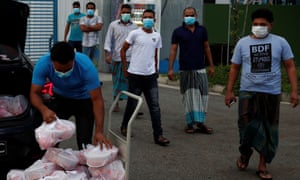


Migrant workers living in a Singapore factory-converted dormitory collect meals donated by charities for their Eid-al-Fitr celebrations. Photograph: Edgar Su/Reuters
The government said dormitories were a practical approach to housing migrant workers in land-scarce Singapore, but it was looking to improve accommodation standards.
It is testing new standards, including increased living space per resident, decreasing bed numbers in each room and reducing how many people would share a toilet and bathroom.
Over the longer term, it is planning to build new permanent dormitories to house up to 100,000 workers, which would take several years to complete. About 11 such dormitories will be ready over the next one to two years.
The government is also studying the possibility of building and leasing out these dormitories. Presently, commercial operators build and operate them.
Around 40,000 migrant labourers, many of whom have been moved out of dormitories into alternative accomodation, have been cleared to resume work. Around half of those had been infected and recovered from the disease.
North Korea will reopen the remainder of its schools this month, according to state media.
North Korean schools usually begin their spring term on 1 April, but it was postponed as the government took various steps to ward off the virus, including sealing its borders.
State media has said high schools and universities started classes on April 20. All other schools, kindergartens, day-care centres and nursing homes will reopen early this month, state radio said late on Monday.
Singapore reopens schools
School children in Singapore have returned to their classrooms for the first time in nearly two months.
Singapore has said it will ease restrictions gradually, with the registry of marriages and some businesses, including pet salons, also reopening on Tuesday.
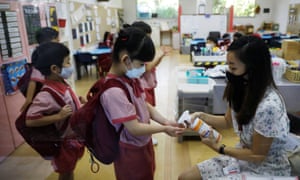


Children returned to school in Singapore on Tuesday after nearly two months away from the classroom. Photograph: Edgar Su/Reuters
Students are required to wear face masks and temperatures are checked and recorded by teachers.
Singapore has recorded more than 35,000 coronavirus cases and 24 deaths. Most cases have been among migrant workers living in dormitories.
Summary
- Global infections from Covid-19 stand at 6,266,193 with deaths at 375,554, according to the Johns Hopkins University tracker.
- South Korea will begin trialling QR codes as part of its track and trace efforts to contain the virus. From 10 June, visitors to nightclubs, bars, karaoke clubs, daytime discos, indoor gyms that hold group exercises and indoor standing concert halls will be required to use an ap that generates a one-time personalised QR code that can be scanned at the door. It follows difficulties tracing potential infections from last month’s Seoul nightclubs cluster of 270 cases, after people gave false or incomplete information.
- Pakistan’s prime minister, Imran Khan, has defended his decision to lift almost all lockdown measures because of economic losses, as cases rise. In a televised address, Khan said his government could not afford to continue giving cash handouts to the poor on such a large scale. He urged people to act responsibly but said more infections and deaths were inevitable. “This virus will spread more. I have to say it with regret that there will be more deaths,” Khan warned. “If people do take care they can live with the virus.”
- New Zealand’s PM, Jacinda Ardern, has said restrictions may be eased again sooner than planned as the country was “ahead of schedule” in tackling Covid-19. Cabinet will decide next Monday whether to move to level-1 restrictions – the most lenient – two weeks ahead of when the government had planned to make that decision. New Zealand has had no Covid-19 cases for 11 straight days. Level-1 is thought to only involve border restrictions.
- The World Health Organization has warned that the increased use of antibiotics to combat the pandemic will strengthen bacterial resistance and ultimately lead to more deaths during the crisis and beyond. WHO director general, Tedros Adhanom Ghebreyesus, said on Monday a “worrying number” of bacterial infections were becoming increasingly resistant to the medicines traditionally used to treat them.
- The risk of Covid-19 infection could double if the 2-metre rule is reduced in UK, a study part-funded by the WHO and published in the Lancet has found. Last week, Boris Johnson said he hoped to “be able to reduce that [2-metre] distance”, to make it easier to travel on public transport and boost the hospitality industry.
- Deaths in Mexico passed 10,000 as the WHO warned that Central and South America had become “intense zones for transmission of this virus” and had not reached their peak in cases.
- Brazil registered 11,598 additional cases of coronavirus and 623 new deaths on Monday, taking its confirmed cases to 526,447 and deaths to 29,937.
- The Armenian prime minister, Nikol Pashinyan, has tested positive to Covid-19. Armenia, which has a population of 3 million, had registered 9,492 confirmed coronavirus cases and 139 deaths as of Monday.
- China reported five new imported cases and no deaths on Tuesday. As of Monday there were 73 active cases in the country, according to the national health commission.
In case you missed it the World Health Organization has warned that that Central and South America had become “intense zones for transmission of this virus” and had not reached their peak in cases.
It came as Mexico passed 10,000 deaths from the virus, with more than 93,000 infections.
On Monday Brazil registered 11,598 additional cases of coronavirus and 623 new deaths on Monday, taking its confirmed cases to 526,447 and deaths to 29,937.
The US remains way out in front and is approaching 2 million infections (1,811,357) with more than 105,000 deaths.
There are grave concerns over the spread of the virus as a result of the mass street protests taking place, including scenes like the one tweeted below, which show police and protesters shaking hands.
ScottGordonNBC5
(@ScottGordonNBC5)Protesters just told police on bullhorn if officers took a knee they would go home. Officers took a knee. Protesters came up to cops and shook their hands, hugged them. Remarkable. pic.twitter.com/WcymGYiUPC
June 2, 2020
Hello, this is Alison Rourke stepping in to the blog for the next couple of hours. If you want to get in touch, you can reach me at [email protected]
Updated
The Guardian’s Sam Levin reports from Los Angeles, with Joanna Walters in New York:
The full story on Anthony Fauci, the government’s top public health expert and a member of the national coronavirus taskforce, saying on Monday that he is no longer in frequent contact with Donald Trump – comments likely to spark fresh fears that he is being frozen out of the White House.
The pandemic continues to ravage communities across the United States, where the death toll on Monday had reached 105,000, and last month Fauci warned the US Congress during a hearing that the virus was not yet under control.
Asked on Monday whether the president talked to him often about Covid-19 vaccine work, he told a reporter with Stat News, “No … As you probably noticed, the taskforce meetings have not occurred as often lately. And certainly my meetings with the president have been dramatically decreased.”
Fauci noted that they used to have taskforce meetings daily, including on the weekend, and said that frequently, the two would talk after the meetings, estimating that a month ago, they met four times a week.
The director of the National Institute for Allergy and Infectious Diseases also told a CNN reporter that he had not spoken or met with Trump in two weeks and that their last interaction was on 18 May, during a teleconference with governors.
The number of confirmed coronavirus cases in Germany increased by 213 to 182,028, data from the Robert Koch Institute (RKI) for infectious diseases showed on Tuesday.
The reported death toll rose by 11 to 8,522, the tally showed.
South Korea’s GDP contraction to worsen
South Korea’s economic contraction will worsen in the current quarter, the central bank forecast Tuesday, as the coronavirus outbreak hits consumer demand and economic activity even harder, AFP reports.
The Bank of Korea predicted the world’s 12th-biggest economy will shrink at least 2.0 percent in the April-June period over the previous three months.
It already declined 1.3% quarter-on-quarter in the first three months, it said – a slight improvement from its first announcement in April of a 1.4% contraction, but still the biggest drop in gross domestic product since the 2008 global financial crisis.
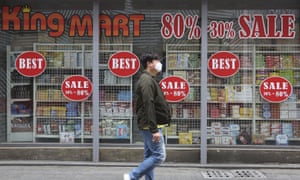


A man wearing a face mask walks by sale signs at a shopping district in Seoul, South Korea. Photograph: Ahn Young-joon/AP
South Korea endured one of the worst early outbreaks of the coronavirus outside mainland China, and while it never imposed a compulsory lockdown, strict social distancing was widely observed from March until it started loosening restrictions last month.
Private consumption decreased 6.5% in January-March from the previous quarter “as expenditures on goods and services both decreased”, the BOK said.
The country appears to have brought its epidemic under control thanks to an extensive “trace, test and treat” programme and life is beginning to return to normal.
But the BOK forecast last week that the economy will shrink 0.2% in 2020, a dramatic downgrade from its February forecast of 2.1% growth, and cut interest rates to a record low.
The International Monetary Fund (IMF) has estimated the world economy will contract three percent this year, saying it is expected to “experience its worst recession since the Great Depression” over the pandemic.
The IMF has predicted the South Korean economy will shrink 1.2% this year.
Updated
Podcast: England is easing out of lockdown – is it safe?
Health officials and even government scientists have warned against the easing of the coronavirus lockdown in England, saying it could lead to a surge in infections. David Hunter, professor of epidemiology and medicine at the University of Oxford, looks at the risks:
Updated
South Korea is testing a new quick response (QR) code system this week to log visitors at high-risk entertainment facilities, restaurants and churches in a bid to track coronavirus cases and prevent further spread of the disease, Reuters reports.
The decision to mandate QR codes to register visitors’ identities came after authorities struggled to trace people who had visited a number of nightclubs and bars at the centre of a virus outbreak last month after much of the information on handwritten visitor logs was found to be false or incomplete.
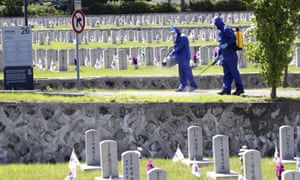


Quarantine officials disinfect as a precaution against the new coronavirus at the National Cemetery in Seoul, South Korea, Monday, 1 June 2020. Photograph: Kim In-chul/AP
Starting 10 June , visitors to nightclubs, bars, karaoke clubs, daytime discos, indoor gyms that hold group exercises, and indoor standing concert halls, will be required to use any of a number of commercially available apps to generate a one-time, personalised QR code that can be scanned at the door.
Local governments may also designate other high-risk facilities such as libraries, hospitals, restaurants or churches.
The person’s information will be logged in a database kept by the Social Security Information Service for four weeks, before it is automatically deleted, according to South Korea’s Ministry of Health and Welfare.
Amid a pandemic and a brewing tropical storm, Mexico President Andrés Manuel López Obrador kicked off Mexico’s return to a new normal Monday with his first road trip in two months as the nation began to gradually ease some virus-inspired restrictions, AP reports.
López Obrador said he’s taking all necessary precautions he drove the 1,000 miles from Mexico City over the weekend rather than flying on a trip to promote construction of one of his signature infrastructure projects the Mayan Train.



The President of Mexico, Andres Manuel Lopez Obrador, waves a flag during an event to mark the start of work on the fourth section, Izamal-Cancun, of the Mayan Train, in Lazaro Cardenas, Quintana Roo, Mexico, 1 June 2020. Photograph: Alonso Cupul/EPA
While the federal governments nationwide social distancing rule formally ended Monday, it is urging people in so-called red zones to maintain most of those measures and so many people are falling ill and dying each day that those zones cover nearly the whole country.
Mexico is nearing 100,000 confirmed infections and has topped 10,000 deaths, but those official tallies are considered to be undercounts.
Mexican officials said last week that more than 5,000 companies had implemented protocols that would allow them to reopen this week. The federal government had cleared businesses in the mining, construction and auto manufacturing sectors to resume operations.
Risk of infection could double if 2-metre rule reduced in UK, study finds



Haroon Siddique
Reducing physical distancing advice from 2 metres to 1 metre could double the risk of coronavirus infection, according to the most comprehensive study to date.
The research, part-funded by the World Health Organization (WHO) and published in the Lancet, will add to the debate in the UK about whether the 2-metre rule should be reduced.
Last week, Boris Johnson said he hoped to “be able to reduce that [2-metre] distance”, to make it easier to travel on public transport and boost the hospitality industry. This would allow extra people inside workplaces, restaurants, pubs and shops, and reduce the length of queues. The prime minister has instructed the Scientific Advisory Group for Emergencies (Sage) to look into the possibility.
The UK guidance is out of line with advice in most other countries and with recommendations from the WHO, which says people should stay 1 metre apart. This is followed by France, while countries such as Germany and Australia have a 1.5-metre rule.
Covid-free island prepares to bring home stranded citizens
Bernadette Carreon reports for the Guardian from Koror:
For 143 Palau citizens trapped overseas by coronavirus travel restrictions, the journey home, always long, will be especially tortuous. To reach their Pacific island home they face six long weeks of quarantine – two in Guam, two in a hotel in Palau, and then another two weeks of self-isolation at home. They will also face at least five Covid-19 tests.
But some Palauans fear that even these measures will not be enough.
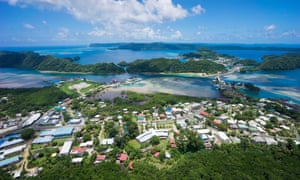


Aerial view, Koror, Palau, in the north Pacific. Photograph: Alamy Stock Photo
Palau, in the north Pacific, is one of a handful of countries globally with zero cases of coronavirus. Having closed its borders on 22 March, the country has grappled with how to bring home its citizens, trapped abroad, particularly in the US, without importing the virus.
The topic has proven hugely divisive as the government has sought to balance the rights of citizens to return with the need to keep its small population safe.

